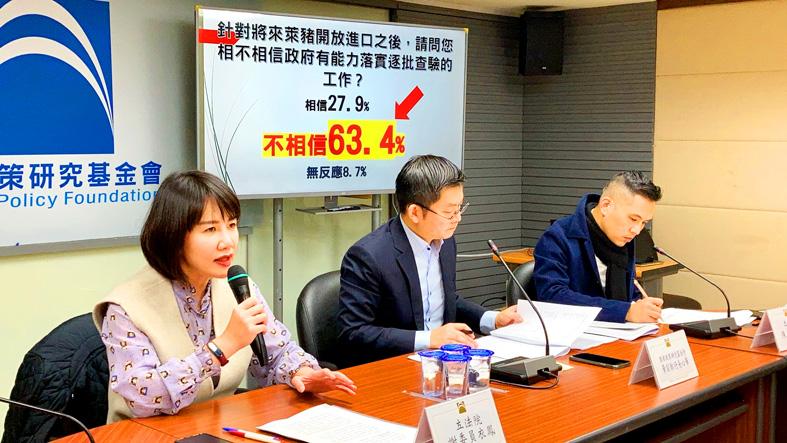Nearly 46 percent of voters showed no clear preference for any political party, a 9.6 percentage point rise from a month earlier, a survey released yesterday by the Chinese Nationalist Party (KMT)-affiliated National Policy Foundation showed.
The survey, which was conducted by Taiwan Real Survey Co from Tuesday to Thursday last week, was based on telephone interviews with 1,077 adults across Taiwan aged 20 or older, said the foundation, which commissioned it.
When asked which political party they “support more,” 22.6 percent of respondents said the Democratic Progressive Party (DPP), 19 percent said the KMT, 7.3 percent said the Taiwan People’s Party (TPP) and 3.9 percent said the New Power Party (NPP), the survey showed.

Photo courtesy of the National Policy Foundation via CNA
Other parties, including the People First Party, the Taiwan Statebuilding Party, Green Party Taiwan, the New Party and the Taiwan Solidarity Union, each received support from less than 1 percent of respondents, it showed.
There were 45.8 percent who did not indicate a preference for any political party, including those who declined to respond to the question, it showed.
A similar survey released by the foundation last month showed that 36.2 percent of respondents did not favor any party.
Since last month, the gap between those supporting the DPP and the KMT has narrowed, while there was a decline in support for all of the major parties, foundation vice president Huang Hsin-hua (黃心華) told a news conference in Taipei.
Last month’s survey showed that 24.7 percent preferred the DPP, while 20.6 percent preferred the KMT — a difference of 4.1 percentage points, Huang said.
This month, the gap was 3.6 percentage points, he said.
The TPP and the NPP last month were favored by 10.4 percent and 6 percent respectively, he said.
The decline in support for political parties across the board coincided with a clear increase over the past two months in the percentage of people who describe themselves as politically neutral, Huang said.
June was a low point for the KMT, he said, adding that the gap between the DPP and the KMT that month was 19.2 percentage points.
“The DPP’s one-party dominance in the first half of this year has come to an end,” he said.
Swing voters are now the “largest party” in Taiwan, he said.
This should encourage political parties, especially opposition parties, to adopt a more pragmatic approach to winning their approval, Huang said.
The survey has a confidence level of 95 percent and a margin of error of 2.99 percentage points, the foundation said.

Palauan President Surangel Whipps Jr arrived in Taiwan last night to kick off his first visit to the country since beginning his second term earlier this year. After arriving at Taoyuan International Airport at around 6:30 pm, Whipps and his delegation were welcomed by Minister of Foreign Affairs Lin Chia-lung (林佳龍). Speaking to gathered media, the Palauan leader said he was excited and honored to be back in Taiwan on his first state visit to Taiwan since he was sworn in this January. Among those traveling with Whipps is Minister of State Gustav N. Aitaro, Public Infrastructure

RESOLUTIONS DEBATE: Taiwan’s allies said that UN and WHA resolutions cited by China and other nations ‘do not determine Taiwan’s participation in WHO activities’ A proposal to invite Taiwan to this year’s World Health Assembly (WHA) was rejected on Monday, resulting in Taipei’s absence from the annual meeting for a ninth consecutive year, although partners spoke up for Taiwan’s participation at the first day of the meeting. The first agenda item after the opening was a “two-on-two debate” on a proposal to invite Taiwan to participate at the WHA as an observer. Similar to previous years, two countries made statements in favor of the proposal, while two others expressed their opposition. Philippine Secretary of Health Teodoro Herbosa, president of the 78th WHA, accepted the WHA General Committee’s

Premier Cho Jung-tai (卓榮泰) on Friday laid out the Cabinet’s updated policy agenda and recapped the government’s achievements ahead of the one-year anniversary of President William Lai’s (賴清德) inauguration. Cho said the government had made progress across a range of areas, including rebuilding Hualien, cracking down on fraud, improving pedestrian safety and promoting economic growth. “I hope the public will not have the impression that the Cabinet only asked the legislature to reconsider a bunch of legal amendments,” Cho said, calling the moves “necessary” to protect constitutional governance and the public’s interest. The Cabinet would work toward achieving its “1+7” plan, he said. The

At least three people died and more than a dozen were injured yesterday afternoon when a vehicle struck a group of pedestrians in New Taipei City’s Sansia District (三峽). The incident happened at about 4pm when a car rammed into pedestrians at an intersection near Bei Da Elementary School. Witnesses said the sedan, being driven at a high speed, ran a red light, knocking scooters out of the way and hitting students crossing the road before careening into a median near the intersection of Guocheng and Guoguang streets. The incident resulted in three deaths and 13 injuries, including the driver, a 78-year-old man